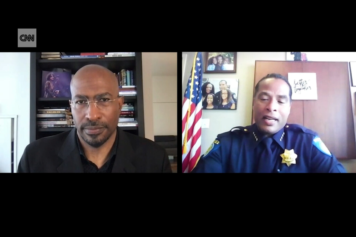
“The United States’ criminal justice system faces significant challenges. Over the past 25 years, the U.S. prison and jail population reached an all-time high and the number of people on probation and parole doubled,” according to the White House’s website. “In 2009, nearly seven million individuals were under supervision of the state and Federal criminal justice systems. Nearly two million of these individuals were incarcerated for their crimes, while the remaining five million were on probation or parole being supervised in the community.”
Last year, Obama directed the Justice Department to look at changing drug sentencing. He granted clemency to several Black people who received long jail terms because of mandatory minimum sentences enforced by the war on drugs. According to The Washington Post, Obama has pardoned 248 inmates.
One of those released drug offenders is Katina Smith, mother of NFL star Demaryius Thomas. She did 15 years of a 20-year drug conviction. According to an ESPN.com article, Smith was convicted after police found cash from a drug operation her mother was involved with in her home. Even though Smith had no criminal record and did not use drugs, she received a mandatory minimum sentence of 20 years. Now Smith is out and trying to learn how to fit into a society that has drastically changed.
“I’m like a child,” said Smith in the ESPN.com article. “I have to relearn everything. It’s information overload, and my head is about to explode.”
Like Smith, many former convicts have a long road ahead of them reintegrating into society.
“There are a myriad of consequences that a criminal conviction can bring,” said Yosha Gunasekera, a New York City criminal defense attorney.
“Reintegrating into society after a conviction is incredibly difficult, because while in prison individuals may have lost their housing, jobs, or even custody of their children. Once they return home, they face the social stigma of serving time in prison, and such a stigma can be extremely alienating,” Gunasekera said.
One of the first problems former convicts can face is simply finding a place to stay.
“Individuals who have been convicted of crime may not be able to live with their family members. It depends on a variety of factors,” said Gunasekera. “For example, if their family member they want to live with lives in public housing, there may be restrictions depending on the crime they committed. Sometimes, there is a full order of protection the incarcerated individual has against him from a family member, which means by law he cannot return home to live with that person. Often many people leave jail and enter a homeless shelter because they have nowhere else to go.”
And then there is also the challenge of finding employment with a criminal record.
“One of the biggest challenges facing individuals in prison is overcoming the stigma of serving time,” Gunasekera said. “This stigma bleeds into almost every facet of a formerly incarcerated person’s life.
She added that sometimes a criminal record can follow you around for the rest of your life.
According to Gunasekera, the U.S. criminal justice system is fraught with unfairness and needs to be overhauled.
“There are many policy changes that need to take place to help formerly incarcerated people,” Gunasekera said. “First, we need to recognize that our current system of mass incarceration does not work. It unfairly punishes the poor and people of color. For example, the racial disparity in the criminal justice system was prominently displayed in the sentencing of crack cocaine versus powder cocaine. Crack cocaine, commonly associated with poor inner-city blacks, was punished 100 times more harshly than powder cocaine associated with the wealthy. Second, we need to find policies that target this bias in the system and also create policies that focus on rehabilitation and not punishment. For example, a low-level nonviolent drug-offender should not be sent to prison but rather should have opportunities for treatment.”
According to Gunasekera, the Black community is still reeling from the war on drugs.
“The impact of the war on drugs has been devastating to the Black community,” she said. “We have a better understanding now, that whites and blacks use drugs at roughly equivalent rates, yet Blacks are much more likely to be sent to prison.”
Society needs to look for alternatives to mass incarceration. Matt Haney, along with former White House green czar Van Jones, is one of the founders of #cut50, an organization’s whose goal is to cut the prison population in half in 10 years. Haney is a liberal who lives in San Francisco, but prison reform is an issue that is receiving surprising bipartisan support.
According to Haney, Jones struck up a partnership with former Speaker of the House Newt Gingrich, after they appeared on CNN’s “Crossfire” together.
“Their jobs were to yell at each and disagree on everything, but they agreed on this issue [prison reform],” said Haney. “They made a commitment to work together and do something about it.”
Conservatives are getting on board the prison reform bandwagon for several reasons, according to Haney. Some are concerned about the ballooning costs of mass incarceration, others are motivated by belief in small government. Others have been impacted by their work in prison ministries.
Now Republican governors in Ohio, Texas and Georgia are leading conversations about reducing the prison population, according to Haney.
“There’s a long overdue national conversation taking place with unlikely political allies about how we actually reduce incarceration,” he said. “It’s [corrections] not a good use of public money. We’re getting very little from it. The recidivism rate in some states is as high as 70-80 percent within three years.”
Haney says reducing the sentences of nonviolent drug offenders, as the Obama administration has done, is a good start, but there needs to be more programs for former convicts when they get out of jail.
“As we’re reducing the prison population, we need to think about better support for people coming home,” he said.
Many criminals commit crime because they can’t find work and live in deprived communities. But Haney pointed out that many of them are released back into communities which are still struggling.
“Many [former convicts] are coming home to communities that continue to be economically depressed,” he said.
He added that it’s tough for anyone to find a job in today’s economy, but having a conviction makes it even more difficult. Coming out of prison with no employment history for 20 years presents a significant challenge. Haney said “banning the box,” the check mark on job applications that asks about your criminal background, would go a long way to helping former convicts find employment.
He also said it would be a good idea if employers started a drive to hire former convicts, similar to the way they are hiring former military personnel.
“We need employers to make a commitment to hire formerly incarcerated people,” Haney said.
Some employers, such as Uber and Target, have taken a proactive stance on hiring people with records, according to Haney.
Haney said that when #cut50 staff were recently at the White House, they discussed how some of the convicts released by the Justice Department’s reforms were doing. Some of them were struggling with the effects of their incarceration. Most of them received clemency, but they were not exonerated. So, their convictions still show up on background searches.
“They were having significant challenges,” he said. “Clemency is not a pardon; they still have a conviction on their record.”
This can prevent a former convict from retraining for a new career because some drug felony convictions prevent people from getting financial aid.
But Haney said that some of the biggest challenges for ex-convicts can be personal and social problems. They have to rebuild relationships with children who were babies when they went away and are now grown adults. And society operates on a different set of rules than prison.
“Life in prison is very different from life outside prison,” Haney said.

